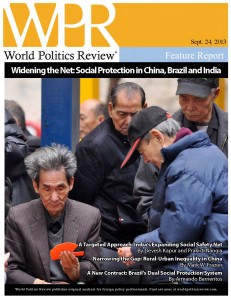We’re excited to share a recently published article in World Politics Review by Mark Frazier. Mark is academic co-director at the India China Institute and a professor of Politics at The New School for Social Research, where he focuses on labor and social policies in China.
In this article Frazier argues that China’s new policies “carry a political significance that is not well understood,” and which he argues are linked to two key trends in China–rapid urbanization and a quickly aging population, both of which are driving recent Chinese social welfare policies.
Here’s a brief excerpt from his article in WPR, titled “Narrowing the Gap: Rural-Urban Inequality in China.”
“By most measures, the income gap between urban and rural households in China is one of the largest in the world, with urban residents’ incomes more than triple those of their rural counterparts. Not surprisingly, then, improving rural incomes has become the main target of social welfare policies in China today, though it is too early to tell whether such policies will be enough to reduce the rural-urban income gap. The new social policies have also been introduced in the context of two long-term demographic trends of great significance: China’s high-speed urbanization and the rapid aging of its population. China’s social welfare policies are in some respects responses to these trends—aimed at preventing both the formation of a vast urban underclass lacking access to basic means of social protection as well as the impoverishment of the elderly.”
You can read the full article here at WPR.

